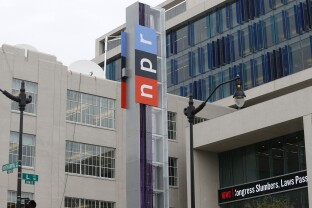The bipartisan Federal Election Commission has unanimously dismissed a complaint from conservative activists who alleged NPR is controlled by the Democratic Party and “clearly and unmistakably” advocated for 2024 presidential nominee Kamala Harris.
The 4-0 ruling, released Monday evening, affirms what the FEC has previously established: that NPR is a legitimate news organization exempt from election laws governing political committees and candidates.
This victory comes at a critical juncture for NPR, as President Donald Trump wants Congress to slash more than $1 billion in federal support for public broadcasting. Trump this month accused NPR of publishing and broadcasting “radical, woke propaganda disguised as ‘news’” while harboring “zero tolerance for non-leftist viewpoints.”
Much of the October complaint from two conservative organizations — the United States Justice Foundation and the Policy Issues Institute — centered on whether NPR is entitled to a federal “press exemption,” which shields news organizations with a track record of producing journalism from federal campaign finance law enforcement actions.
The conservative groups argued that NPR does not meet “press exemption” standards because it “does not operate like a typical news organization.” They cited criticism of NPR’s standards by former NPR business editor Uri Berliner and President and CEO Katherine Maher’s pre-NPR history of donating small amounts of money to Democrats before she took over the news organization. They also submitted a 53-page report entitled “NPR Exposes: Why NPR Fails FEC Press Exemption” that lists numerous examples of alleged coverage bias.
But the FEC’s general counsel concluded that NPR “appears to have been acting within its legitimate press function and thus its activities are protected by the press exemption.”
The FEC’s four commissioners — Republicans Trey Trainor and Allen Dickerson and Democrats Shana Broussard and Dara Lindenbaum — officially voted to dismiss the complaint on February 24.
NPR representatives did not immediately respond to a request for comment. But NPR attorneys Michael Bopp and Matthew McGill argued in a November letter to the FEC that “NPR is an independent, nonprofit media organization” and “is in no way controlled by any political party, political committee, or candidate.”
The attorneys further asserted that it is “entirely incorrect” for the conservative activists to allege that the Democratic Party “exercises control” over NPR.
“Any further inquiry is not only unwarranted, but would also waste the Commission’s valuable resources and intrude on NPR’s own First Amendment rights,” Bopp and McGill wrote.
The FEC previously affirmed in a 2017 complaint against NPR and then-host Audie Cornish that NPR is a press entity entitled to the government’s press exemption.
United States Justice Foundation President Jim Lacy told NOTUS on Tuesday that his organization does not intend to drop the matter and will now look to sue NPR in federal court.
“Was the FEC ruling fair? No, but it was expected, and it does not preclude our continuing the case to get to the bottom of illegal coordination,” Lacy said. “So the case continues … our focus will be on the discovery tools the process offers to uncover the facts of illegal coordination between Democratic Party officials and NPR.”
Dave Levinthal is a Washington, D.C.-based investigative journalist.
Sign in
Log into your free account with your email. Don’t have one?
Check your email for a one-time code.
We sent a 4-digit code to . Enter the pin to confirm your account.
New code will be available in 1:00
Let’s try this again.
We encountered an error with the passcode sent to . Please reenter your email.


